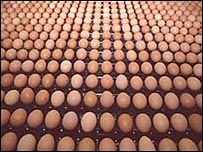Elizabeth Weise of USA Today writes in a story just posted on-line that there is nothing small scale about Pearl Valley Eggs, deep in the heart of Illinois farm country. The egg farm itself, two miles south of the  nearest town, is a neat collection of 350-foot- and 450-foot henhouses covered in white steel siding. They’re linked by overhead pipes that bring in ground corn and soybeans from the farm’s own feed mill and conveyor belts that take out chicken poop.
nearest town, is a neat collection of 350-foot- and 450-foot henhouses covered in white steel siding. They’re linked by overhead pipes that bring in ground corn and soybeans from the farm’s own feed mill and conveyor belts that take out chicken poop.
The farm employs 100 people and produces 800,000 to 850,000 eggs a day, seven days a week.
Yet, in the face of the nation’s largest recorded egg recall, a total of 550 million eggs potentially infected with salmonella enteritidis, and revelations of filthy conditions at the two Iowa egg farms involved, many animal rights groups and organic supporters have pointed a finger of blame at industrial animal agriculture.
Ben Thompson, 30, who runs Pearl Valley Eggs with his father, Dave, who founded the business in 1987 and now houses 1.1 million Shaver chickens in seven henhouses, says since the Thompsons began testing a decade ago, the farm has never once had a positive test for salmonella enteritidis.
The story says there is a definite link between large flock size and salmonella. On average, large-scale U.S. layer operations with more than 100,000 hens per house are four times more likely to test positive for salmonella enteritidis than smaller houses with fewer than 100,000 hens, according to a paper set for publication in January in the journal Poultry Science. The report suggests that one reason might be that salmonella is transmitted in contaminated feces and dust, and higher densities of birds mean more of both.
At the same time, scientists caution that there haven’t been good studies to show the rate of salmonella infection in equally large flocks that are cage free.
Jeffrey Armstrong, dean of the School of Agriculture and Natural Resources at Michigan State University in East Lansing, says, "It is about management — each type (of production method) has its advantages and disadvantages."
At Pearl Valley, Dave Thompson says happy hens, safe eggs and making a profit are possible, but it takes a lot of attention to detail and spending 12 hours a day, seven days a week in the barns. "I take good care of my birds and my wife, and I put every penny back into the farm."
